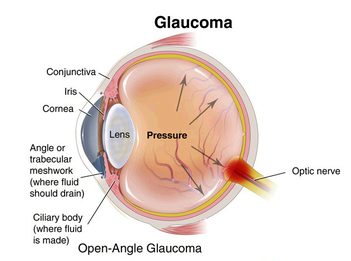
What is open-angle glaucoma?
Open-angle glaucoma is a disease in which the nerve that connects the eye to the brain (optic nerve) is damaged due to the pressure inside the eye. The eye pressure can damage the optic nerve and cause vision loss or blindness.
What is narrow-angle glaucoma?
Narrow-angle glaucoma is a disease in which eye pressure build up in the eye is related to a problem in the anatomy of the eye. The iris (colored part of the eye) and the cornea (clear surface of the eye) are too close together.
Several factors are considered in order to diagnose and evaluate glaucoma:
- Dilated eye exams to detect nerve damage
- Measurements of eye pressure
- Side vision testing to detect early vision loss from glaucoma
- Scans of the optic nerve to detect damage
How does it occur?
The eye is filled with fluid. There is a complicated system of fluid flowing into the eye and fluid draining out through small channels inside the eye. High pressure can occur if this system is disrupted.
How is Glaucoma treated?
Prescription eye drop medications can be used to lower eye pressure. Once these drops are started, they may need to be continued for the rest of your life.
A laser procedure that can lower the eye pressure is available in our office. This can be done as an alternative to eye drops or in combination with eye drops. This procedure helps open the existing outflow channels in the eye. Certain types of glaucoma respond better to laser treatment than to eye drops.
Narrow-angle Glaucoma is treated with a laser procedures that creates an opening in the iris. This improves the flow of fluid in the eye and can prevent optic nerve damage.
Surgical procedures in the operating room may be necessary to create new outflow channels in the eye.
Keep a Close Eye on Your Vision:
Glaucoma is a “silent thief” of vision. Vision loss can occur without symptoms until the disease is very advanced. Glaucoma leads to permanent vision loss.
If you are a “Glaucoma Suspect”, frequent tests with your eye doctor to evaluate the health of the optic nerve are usually necessary to prevent a silent progression to glaucoma. If you have Glaucoma, you should have a treatment plan with your eye doctor.
Open-angle glaucoma is a disease in which the nerve that connects the eye to the brain (optic nerve) is damaged due to the pressure inside the eye. The eye pressure can damage the optic nerve and cause vision loss or blindness.
What is narrow-angle glaucoma?
Narrow-angle glaucoma is a disease in which eye pressure build up in the eye is related to a problem in the anatomy of the eye. The iris (colored part of the eye) and the cornea (clear surface of the eye) are too close together.
Several factors are considered in order to diagnose and evaluate glaucoma:
- Dilated eye exams to detect nerve damage
- Measurements of eye pressure
- Side vision testing to detect early vision loss from glaucoma
- Scans of the optic nerve to detect damage
How does it occur?
The eye is filled with fluid. There is a complicated system of fluid flowing into the eye and fluid draining out through small channels inside the eye. High pressure can occur if this system is disrupted.
How is Glaucoma treated?
Prescription eye drop medications can be used to lower eye pressure. Once these drops are started, they may need to be continued for the rest of your life.
A laser procedure that can lower the eye pressure is available in our office. This can be done as an alternative to eye drops or in combination with eye drops. This procedure helps open the existing outflow channels in the eye. Certain types of glaucoma respond better to laser treatment than to eye drops.
Narrow-angle Glaucoma is treated with a laser procedures that creates an opening in the iris. This improves the flow of fluid in the eye and can prevent optic nerve damage.
Surgical procedures in the operating room may be necessary to create new outflow channels in the eye.
Keep a Close Eye on Your Vision:
Glaucoma is a “silent thief” of vision. Vision loss can occur without symptoms until the disease is very advanced. Glaucoma leads to permanent vision loss.
If you are a “Glaucoma Suspect”, frequent tests with your eye doctor to evaluate the health of the optic nerve are usually necessary to prevent a silent progression to glaucoma. If you have Glaucoma, you should have a treatment plan with your eye doctor.

